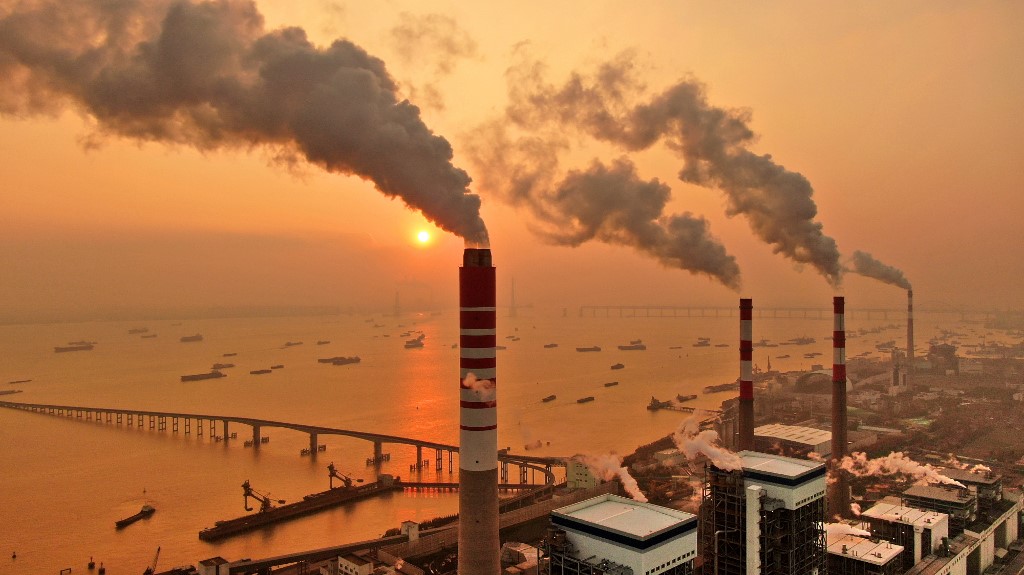China is set to launch a long-awaited national carbon emissions trading scheme (ETS) online by the end of June this year, in a bid to speed up the nation’s efforts to curb pollution and help become carbon-neutral by 2060.
During a visit to Hubei province and Shanghai city, Huang Runqiu, minister for Ecology and the Environment, urged local officials to carry out full-scale testing and integration of the trading system as soon as possible to ensure online trading can be launched by the end of June, a statement issued by the ministry on Sunday said.
China has set up the trading platform for the national ETS in Shanghai and a registration platform in Wuhan city in Hubei.
Carbon trading is the process of buying and selling permits to emit carbon dioxide or other greenhouse gases. If a company curbs its emissions significantly, it can sell surplus permits in the market. If it fails to limit its emissions, it has to buy unused allowances in the market.
Trading of emission allowances is Beijing’s latest attempt at using capital market tools to help get its massive greenhouse emissions under control.
World’s worst carbon emitter
China, the world’s second-largest economy, is as worst emitter of carbon dioxide globally, surpassing the levels generated by the US and Europe combined. The country is responsible for 10 billion tonnes of carbon dioxide emissions annually, or about 30% of the global amount.
The national program will initially include enterprises in the power generation sector.
The ministry published a document in December setting out the 2019-2020 allocation of carbon emission allowances for the sector and a list of 2,225 companies that would be given permits.
The government also published rules governing carbon emissions trading in December, which took effect on February 1.
The nationwide scheme has been delayed repeatedly, partly due to concerns over the accuracy and transparency of emissions data.
Carbon neutral pledge
President Xi Jinping made a pledge that China will aim to be carbon neutral by 2060 while addressing the 75th session of the United Nations General Assembly via video in September.
Under the 2015 Paris climate agreement, China must work toward ensuring peak emissions by 2030, before pushing for zero level by 2060.
To achieve these targets, Beijing will have to curtail most coal power plants, fossil fuel production facilities and drastically install more equipment to harness clean and renewable energy – such as solar and wind power.
Xi has pledged to move the emissions trading system higher up the government’s agenda.
Zhou Xiaochuan, a former central bank governor, suggested in November a tie-up between global carbon trading markets, akin to the Stock Connect programme linking mainland and Hong Kong stock exchanges, saying a fragmented market will cause pricing and efficiency issues.
China’s Carbon Market Incomplete, Study Finds
A policy study by a team from the Central Bank Research Bureau has voiced reservations about the current global carbon market, saying it faces four main “contradictions” – market segmentation, uncertainties (or risks), low carbon prices, and insufficient capacity for carbon finance innovation, according to a report in The Paper, a Chinese news outlet, in January.
China’s carbon market has a solid foundation and huge potential to be an important market-oriented emission reduction tool, the report said. However, the study also noted that since a unified national carbon market has just started, it needs to put find effective solutions to outstanding problems such as an imperfect policy framework, insufficient degree of financialization, and the “inadequate” role of the carbon market.
The overall policy framework of China’s carbon market is incomplete and its international status is low.
The degree of financialization in China’s carbon market is generally low, the study said. Although pilot regions and financial institutions have developed products such as carbon bonds, carbon futures, carbon options, and carbon funds, carbon finance is still in a sporadic pilot state. Regional development is uneven, and there is a lack of a systematic and complete carbon finance market, so it “could not meet control requirements”. Companies producing carbon emissions did not have the management capacity to manage carbon trading in areas such where ‘Belt and Road’ projects were undertaken. Professional investors were ‘underdeveloped’, while the carbon finance sector lacked long-term financial support.
So, China’s carbon market was not working, it said. The research team noted that international practice had shown that a carbon finance market is highly dependent on intense carbon emission controls and mature carbon emission rights with a spot trading market. Unlike Europe and the US, where financial functions are built into the carbon market, carbon finance is a more subordinate market tool for carbon emission reduction, it said. This was an important reason for the insufficient outcome.
The other key factor driving implementation of a more credible system in China is the fact that major trading partners such as the European Union and the United States now have leaders who rate global warming as a international priority. Indeed, analysts say failure to take significant action to curb emissions could hamper trade and economic relations with these two regions.
• By Iris Hong and Jim Pollard
This report was updated on December 28, 2021 for style purposes.
ALSO SEE:
PBoC outlines shortcomings in China’s carbon trading scheme
China Must Nix Its Coal Addiction to Reach Carbon Neutral Pledge
New coal projects in China make up 90% of global total
China should not give stimulus to coal plants
China hurting efforts to cut global emissions: US
G20 nations give $77bn a year to fossil fuel projects
India opens up coal mining to private sector
























